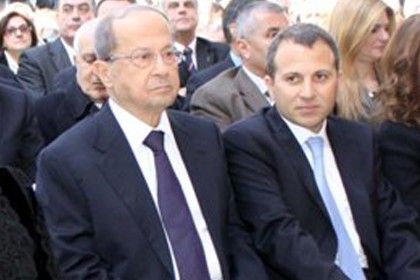Michel Aoun: Machiavelli’s Prince or Saint-Exupéry’s Little Prince?
Claude Salhani/The Arab Weekly/November 06/16
Many Lebanese remain divided over the country’s former army commander Michel Aoun, who after vying for the presidency for nearly two decades was finally voted to the top job. Just getting all of Lebanon’s opposing political parties to agree on the candidate after two years without a president is quite an accomplishment.
Getting those of varying political agendas such as Hezbollah and conservative Christian parties to agree to sit at the same table requires a certain degree of political know-how.
A former Lebanese army general, Aoun was forced into a 14-year exile in France because he opposed Syria’s presence in Lebanon but has now won the presidency with Syria’s support. But does that make him Niccolo Machiavelli’s Prince or Antoine de Saint-Exupéry’s Little Prince?
After numerous attempts to find a president acceptable to all political factions, foreign and domestic, the Lebanese parliament has made Aoun proud with his unexpected last-minute political alliances. The result placed him ahead of his rivals for the post, which under Lebanon’s sectarian system is awarded to a Christian.
Some Lebanese see Aoun as the leader who will take the country out of its years of political wilderness. Others regard him as a renegade officer and loose cannon who could well reignite the civil war. If nothing else, Aoun is a highly controversial, if not somewhat enigmatic figure. But is he the Prince or the Little Prince?
While Saint-Exupéry, who served as a French military aviator during the second world war and ultimately disappeared in the southern Mediterranean when his aircraft crashed, may have had more in common with the Lebanese military officer, Aoun picked up more on the practicality of politics from Machiavelli.
Despite his political shortcomings, Aoun promised to change Lebanon’s stagnating politics and do away with corruption and sectarianism. This alone has given the 83-year-old military officer-turned politician a head start in the race to the presidency.
The retired general claims much credit for Syria’s rapid exit from Lebanon.
This is worrying many Lebanese who view Aoun with suspicion, if not outright revulsion. Others see in him new hope.
“We have to put the past behind us,” said Tony Haddad, a close aide who lobbies for the general’s interests in Washington.
This might not be as easy as it sounds. Before his exile, Aoun made many enemies when he took on the Syrians, then the Christian militias in one of the final, but harshest, stages of the 1975-90 Lebanese civil war.
So how do you put the past behind you? First, you forgive your enemies, hoping they will forgive you. Second, you try to introduce reconciliation — a relatively little-tested concept in Lebanon. Third, you try to win the people’s trust.
“Transparency is going to be the key,” Haddad said. “People trust him, they want a clean leadership.”
Haddad said some of the antipathy felt by many Lebanese towards Aoun was the clash of “reformers versus traditionalists”. Haddad called Aoun a “reformer” who wants to change things. Indeed, his uttering this one word, “change”, was enough to ensure Aoun the support of hundreds, if not thousands, of followers.
“I think his vision is beyond what most people can comprehend in this region,” said Haddad.
It is, however, precisely this vision that is being questioned. A vision many accuse of being rather blurred and quick to forget the past.
“Ask him about the millions of dollars he received from Saddam Hussein,” suggested a Lebanese friend. I did ask.
“The general got help from Saddam but he gave him nothing in return,” said Haddad, adding even former US secretary of Defense met with Donald Rumsfeld had, in the past, met with the now executed Iraqi president.
“The help from Iraq was unconditional,” said Haddad. “We gave nothing in return.”
“Ask him why is it that he has allied himself with the most avid supporters of Syria,” said the same Lebanese friend. I did ask.
In politics, things change, alliances change, explained Haddad, adding all Lebanese politicians, including opposition leader Walid Jumblatt, have in the past dealt with Syria.
It was late at night as I sat down to write these words and caught sight of Machiavelli’s ghost as it floated over my desk.
“Niccolo, is this correct? Is it true?” I asked.
Looking somewhat ashen and in a great hurry to escape Levantine politics, Machiavelli replied, “Certo, certo,” (sure, sure) before quickly disappearing into the night.
But if Machiavelli’s ghost ran away, my friend persisted.
“Ask him how come he has given the Syrians a clean bill of health by announcing they are no longer in Lebanon under any guise when the United Nations hasn’t yet? What was his hurry to do so?” added my friend.
I did ask.
“The general carries no grudges against his former enemies,” replied Haddad.
The general may carry no grudges but some of the people he shelled during the “war of liberation” find it hard to forget. Summing up the feelings of many Lebanese who fall into that category, another friend from Beirut simply said: “Ask him when he is going back to Paris?”
Alas, the ghost was gone before I could get an answer to that last question.
**Claude Salhani is the Opinion section editor of The Arab Weekly.






















